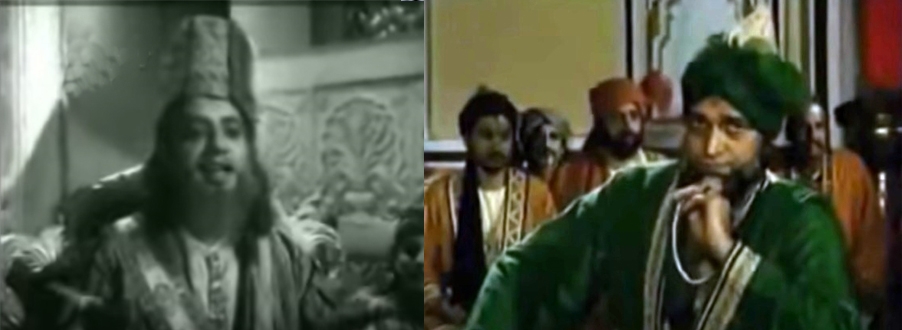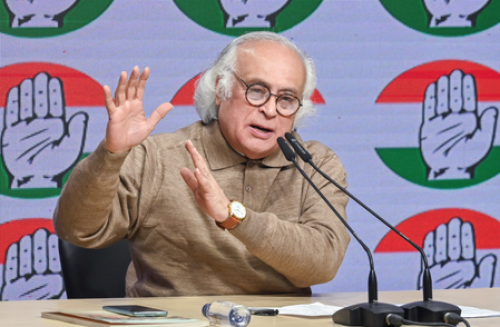His portrayal as an insecure and devious court poet, jealous of emerging talent, in TV serial "Mirza Ghalib" may be termed artistic license, but is actually disservice to 'Zauq'. While most historic accounts depict him as a courteous and contemplative man, his poetry also shows a loftiness of thought, that makes him an early stand-bearer, if not pioneer, of what would later become existentialism. No doubt there was some rivalry between Zauq and Ghalib, as is between leading practitioners of any craft, but it did not lend itself to such snide behaviour from him as in the serial. His depiction in the film "Mirza Ghalib" is more balanced, where he does not lose his equanimity as audience beating him to complete some of his best known shers, and then, goes on to introduce Ghalib when the latter's turn comes. Sheikh Mohammad Ibrahim 'Zauq' (1789/90-1854) hailed from modest circumstances, being the son of a mere soldier in what was left of the once-glorious Mughal Army. His elementary education was at the house of a nearby cleric, who also wrote poetry and was consulted by aspiring poets. Their discussions made an impression on young 'Zauq'. "As I used to hear them, many verses stuck in my memory. My heart received a sort of spiritual pleasure from the reading and hearing of poetry. And I used to wander around, always reciting to myself. My heart was full of enthusiasm, and I used to pray to God, 'Oh God, may I learn to compose poetry!" author Mohammad Hussain Azad, who personally knew Zauq, quoted him as saying in his magisterial "Aab-e-Hayat", the first-ever history of Urdu poetry (1880). The self-learnt 'Zauq' also got some guidance from a senior poet, before the latter grew indifferent, and then envious. A showdown ensured when he wrote a ghazal on the metre of celebrated poet Mirza Mohammad Rafi 'Sauda' and was roundly abused for his presumptuousness. As the "Aab-e-Hayat" recounts, 'Zauq' went and reflected in a shrine where he ran into another senior poet of his acquaintance, who asked why he was so downcast. As 'Zauq' revealed what had happened, the poet asked him to recite his ghazal, praised it, and told him to go ahead with it at a mushairah, saying "If anyone makes an objection, it will be my responsibility to answer it." And as Azad writes, 'Zauq' did and it was a turning point: "... Now his poetry began to be more widely spoken of. The liveliness of his temperament and the energy of his verses began to run through listeners' hearts like electricity... Venerable elders of pure temperament, who were the living memorials of the masters of the past, saw him in the mushairah and graciously praised him and lifted his heart. In fact, if they arrived after he had recited his ghazal, they made him recite it again. His ghazals began to fall from the lips of the singers, and scatter colour through streets and bazaars...." "Aaya hoon nur leke main bazm-e-sukhan mein 'Zauq'/Aankhon pe sab bithayenge ahl-e-sukhan mujhe" as he wrote. 'Zauq' went on to become a poet laureate at the imperial court when just 19, a special favourite and poetic instructor of Crown Prince Mirza Abu Zafar Siraj-ud-din Muhammad, who paid him monthly salary of Rs 4 then. This was hiked when the Prince became Emperor Bahadur Shah 'Zafar' - though to only Rs 30 due to the machinations of a greedy courtier, and then to the intended Rs 100, after this employee was sacked. Poetic preceptor to the Emperor himself and titled "Malik-us-Shoara" (king of poets), and "Khaqani-e-Hind" after the fabled 12th century Persian poet and more popularly than Ghalib and other contemporary poets of his time, 'Zauq's position as the Emperor's Ustad meant that he never had enough time for his own poetry. And then, a major segment of his work was lost in turmoil Delhi went through in 1857. While his court role meant he was tasked with writing 'qasidas' (odes) mostly, 'Zauq' was at home in ghazals too - with whatever of his corpus that has survived, as reconstructed from memories of his disciples and admirers, testament enough. And in these, his focus was on some deep questions. As one of his most famous sher goes: "Ab to ghabra ke ye kahte hai ke mar jaayenge/Mar ke bhi chain na paaya to kidhar jaayenge" (or "Mar gaye par na laga ji to kidhar jaayenge", as a variant goes). And from this, 'Zauq' went on to man's relation to the world, to ascertain if the latter was friendly, hostile or supremely indifferent? Like the angst-ridden quartet of writers and philosophers - Danish Soren Kierkegaard, Russian Fyodor Dostoyevsky, German Frederick Wilhelm Nietzsche (German) and Frenchman Jean-Paul Sartre - who are acknowledged as Existentialism's pioneers - he seem to have favoured the last. However, he was not the Asian pioneer - over half-a-dozen centuries ago, Persian astronomer-poet Omar Khayyam (1048-1131), in one of his quatrains, translated and popularised by Edward Fitzgerald, had observed: "Into this Universe, and why not knowing,/Nor whence, like Water willy-nilly flowing:/And out of it, as Wind along the Waste,/I know not whither, willy-nilly blowing." 'Zauq', in another well-known ghazal - immortalised by both K.L. Saigal and Begum Akhtar, echoed these sentiments: "Layi hayat aaye qaza le chali chale/ Na apni khushi aaye na apni khushi chale". What could be a more poetic expression of existentialism than the couplet: "Behtar to hai yehi ke na duniya se dil lage/Par kya karen jo kaam na bedillagi chale" or "Naazaan na ho khirad pe jo hona hai vo hi ho/Daanish teri na kuchh meri daanishvari chale". Pessimistically, he goes on: "Kam honge is bisaat pe ham jaise bad-qimaar/Jo chaal ham chale vo nihayat buri chale" and "Duniya ne kis ka rah-e-fanaa mein diya hai saath/Tum bhi chale chalo yun hi jab tak chali chale" before ending "Jati hawa-e-shauq mein hai is chaman se 'Zauq'/Apni bala se baad-e-saba kahi chale". But all is not despondency and gloom in Zauq's poetry - and he could use the usual tropes too: "Shamaa bhi kam nahi kuch ishaq mein parvane se/Jaan deta hai agar voh to yeh bhi sard deti hai". He frequently shows wit, and even trenchant satire. The ghazal that begins "Ab to ghabra ke.." ends: 'Zauq' jo madarse ke bigde hue hai mullah/Unko maikhaane mein le aao sanvar jaayenge". In one self-referential 'maqta', he quips: "Na huya par na huya 'Mir' ka andaaz naseeb/'Zauq' yaaron ne bahut zor ghazal mein maara". How can such a poet be deprecated or forgotten? (Vikas Datta can be contacted at vikas.d@ians.in)
'Zauq': A pioneer of poetic existentialism, not a Ghalib detractor
- by Rinku
- February 20, 2023 2 minutes

A pioneer of poetic existentialism, not a Ghalib detractor
Statue of Jain King Bharata to come up in Ayodhya
February 20, 2023









